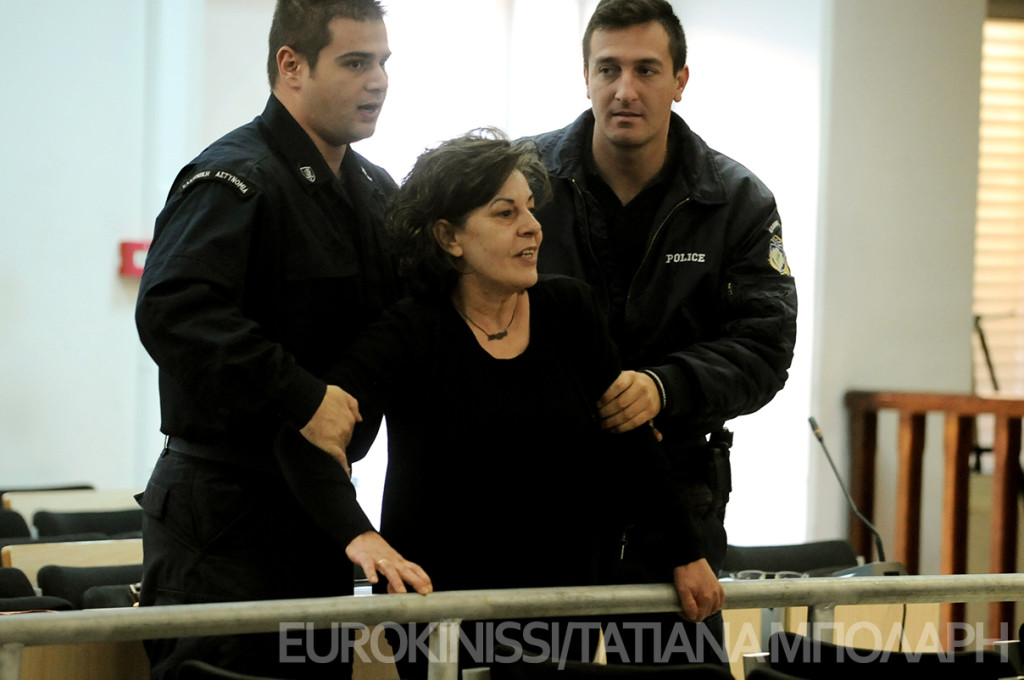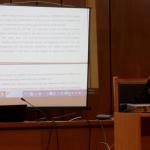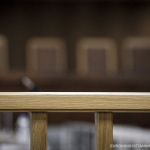26th Hearing, Women’s Section, Korydallos Prison, Athens, 6 November 2015
1. Court access
Hearings remain accessible to members of the public, provided they present their identity cards at the entrance. However, the crowd in the courtroom had thinned. The spaces reserved for journalists are almost always occupied. A malfunctioning microphone added to the list of problems with the venue.
2. Presence and representation of the defendants
Seven (7) defendants were present at the beginning of the hearing. Twenty-one (21) were listed as absent. The remaining defendants were represented by their counsel.
3. Statements/comments from the civil counsel regarding the testimony of Dimitris Kourentzis
Counsel representing the civil action in the case made their statements on the evidence presented in court by policeman Dimitris Kourentzis.
Andreas Tzelis (for the Fyssas family) began by stating that the witness’s testimony confirms defendant Giorgos Roupakias’ confession, “I did it, don’t tell anyone, I’m a Golden Dawner.” Moreover, it identified the murder weapon and revealed the existence of a criminal organisation, even though the witness could not say it outright. The witness’s testimony reveals that Roupakias was trained by Golden Dawn and was “made out of the flesh and blood of the organisation”.
Ellada Christopoulou, who then took the floor, commented on Roupakias’ behaviour after the killing, particularly his carefreeness in the patrol car. She placed particular emphasis on the gravity of the threats received by Kouretzis.
Violetta Kougatsou referred to the actions of the Dias motorcycle police unit on the night, whose officers merely restrained bystanders rather than prevented the murder. She said “Pavlos died helplessly, killed on front of the police. These policemen did not represent the Greek people.” As regards Roupakias’ behavior after the murder, she dwelt on Kourentzis’ statement that he had seen people petrified by shock, and Roupakias was not one of them. She concluded that Roupakias could not have remained so calm if he didn’t have some form of backing. Regarding the threats received by Kourentzis, Kougiatsou suggested that they are confirmed by the witness appearing afraid to state that he is aware of the slogan “Blood, Honour, Golden Dawn” or the identity of Golden Dawn’s leaders, both of which are common knowledge.
Eleftheria Tompatzoglou made the same point, arguing that the witness’s reluctance to answer any question directly regarding the organisation and activity of Golden Dawn demonstrated his profound fear.
Chrysa Papadopoulou noted that Kourentzis had also confirmed the presence of 4–5 men and the exact time of the murder. She added that Kourentzis had arrived on the scene at once and done everything right. The contradictions between the testimony of Dias officer Giorgos Rotas and that of Kourentzis need to be clarified.
Thanasis Kampagiannis (for the Egyptian fishermen) commented that, together with Kourentzis, four policemen have confirmed that Golden Dawn as an organisation was present and actively participated in the murder. In addition, the physical perpetrator said minutes after the killing that he was a Golden Dawner, which shows the organised nature of the crime. His confession and Golden Dawn leader Nikos Michaloliakos’ acceptance of political responsibility for the murder are proof that Golden Dawn was behind the crime. Roupakias’ statement, “I’m one of you guys” demonstrates Golden Dawn’s protection by the state authorities, notably by the police, which, on that night “hardly behaved honourably”. Finally, Kampagiannis commented that Kourentzis’ statement that police headquarters knew that Golden Dawners were attacking foreigners will be of particular interest in the Egyptian fishermen’s case.
His colleague Kostas Papadakis stressed that, as article 351 of the code of criminal procedure allows the court to determine the order of witnesses, it might be useful to have all of the policemen testify consecutively. The ease with which, according to Kourentzis, Roupakias interacted with the police should concern the court and the prosecutors. Moreover, he insisted on the following points: Kourentzis was originally called to testify before investigating magistrates eight months after the murder; the Dias motorcycle police remained at an 80-meter distance from Fyssas and it was not they, but a friend of Fyssas, who pointed out the killer to the witness; the killer confessed after Kourentzis told him he had found DNA and fingerprints on the murder weapon; the witness’s confession inside the patrol car demonstrated his sense of security – a justified one given the organisation’s assault divisions are supported by the Greek police. The conversation inside the patrol car was kept secret until 8 May 2014; moreover, Michaloliakos assumed political responsibility for the murder, which Golden Dawn had initially denounced publicly. Michaloliakos’ claiming of political responsibility for the murder has concerned the entire nation; Papadakis suggested that it should concern the court and the prosecutor as well.
Takis Sapountzakis (for the PAME trade unionists) stressed that Kourentzis’ testimony confirmed the existence of a criminal organisation. Roupakias had been informed, he directed himself to the specific bar, killed Fyssas and emerged unscathed and entirely calm; he smoked, he tried to escape but didn’t manage it. According to Sapountzakis, Roupakias was a hit-man, a cog in a plan devised by the higher-ranking organs of the organisation. Roupakais thought that the police were Golden Dawn. Someone must have said to him, “My boy, go and make a kill; no one will stop you.” The threats against the witness were made a few days before his testimony; the threats were made “by those who stand accused and who are threatened by his testimony.”
His colleague Antonis Adanasiotis dwelt on the brazenness with which the criminal organisation acts; it believes it is invulnerable, a belief that makes it all the more dangerous.
Eleni Zafiriou (also for the PAME members) focused the first part of the evidence (before the break), during which time the witness had answered her questions regarding Golden Dawn’s modus operandi, referring to the assault divisions’ attacks. She continued to note that following the defence’s attack on the witness and the consequent commotion in the courtroom that led to the break, the witness returned and answered all remaining questions pertaining to the assault divisions by insisting that he didn’t know anything. He even claimed not to recognise leading Golden Dawn figure MP Ilias Kasidiaris when he was shown a picture of him. This is a clear case of witness intimidation, as is shown by his plea to the court to make security provisions for him and his family.
Thodoros Theodoropoulos (also for the PAME members) commented on the initial report to the police station: that there were Golden Dawn members holding bats, etc., and connected these people to the final outcome: the murder of Fyssas. The fact that, following his arrest and detention at the police station, Roupakias was left in a room on his own, his phone was not confiscated and he made six phone calls to the Golden Dawn cell leader in Nikea shows that the hard core of the state abetted the cover-up.
Angelos Vrettos commented on the fact that Kourentzis knew of the attack on the PAME trade unionists and insisted that this demonstrates the planned and uniform activities of the organisation. The civil action raised the issue of the threats to Kourentzis because of the existence of a criminal organisation which is outlined in the indictment.
Haris Stratis spoke of the threats received by Kourentzis, and by witnesses Pavlos Seirlis and Dimitris Melachrinopoulos as well. He said he was sure that many more witnesses would come forward to say that they have been threatened; this is the organisation’s tactic for enforcing a law of silence.
Manos Malagaris said that differences between testimonies did not necessarily amount to contradictions. He mentioned the example of whether Roupakais was smoking or not – a matter raised by the prosecutor. He insisted that Roupakias was not smoking to calm his nerves; rather, he was simply sitting in the car waiting to run away with his people. It is a criminal organisation that acts in unison and escapes in unison.
4. Statements/comments from the defence regarding Kourentzis’ testimony
Counsel representing the civil action in the case made their statements on the evidence presented in court by policeman Dimitris Kourentzis.
Christoforos Tsagkas (for Ioannis Aggos, Giorgos Germenis and Anastasios Michalaros) took the floor. He referred to the witness’s statement that Roupakias could have run away if he had wanted and argued that this invalidated arguments that this was a premeditated and professional attack. He added that the civil counsel’s claim that the law enforcement and judicial authorities cover for Golden Dawn will be dealt will be judged. At this point, the presiding judge responded: “Where did you hear that? This is the first we’ve heard of it?”
N. Kontovazenitis (for Anastasios Anadiotis) referred to the crowd on Tsaldari St, and said that no crimes or complicity in crimes took place there. Finally he said that Kourentzis did not confirm that Melachrinopoulos was present at the murder scene.
Dimitra Velentza said that Kourentzis, like the other witnesses, did not make any points relevant to the indictment.
Vasilis Oplantzakis elaborated on purported contradictions and discrepancies in Kourentzis’ testimonies, specifically as regards the matter of who identified the murderer to him and the 4–5 people who surrounded Fyssas after the fact: Kourentzis said they were his friends, while Panagiotis Fyssas had testified that they were policemen and “strange people”.
Giorgos Roumpekas (for Giorgos Roupakias) began by referring to Kourentzis’ testimony an “an exaggeration” and insisted that Roupakias must have been sitting in the car waiting to be arrested and, seizing the opportunity, lit a cigarette. Kourentzis, Roumpekas said, “experienced his first arrest like in the movies, slightly American”. He concluded that the conditions in which the car was found: parked on the wrong side of the road, the engine and lights still on, signalled that something violent had happened to the driver; he must have been threatened into getting out. Roupakias’ version, the real version, according to Roumpekas, is that Fyssas and his friends attacked him.
Angelos Angeletos stated that Kourentzis’ testimony was inspired by the American series CSI. He added that defence counsels, too, had been the subject of threats; four of their offices have been burnt down.
Giorgos Michalolias asked why civil counsel did not question Rotas about threats made against him, and concluded that civil counsel’s strategy is to attribute any elements in witnesses testimonies they find inconvenient to a supposed fear.
Pangiotis Michalolias began by saying that, typically, he should not be commenting on the Kourentzis’ testimony because he was telling the truth. Another reason for not commenting was because he represented Nikos Michaloliakos, to whose trial the civil action has not been admitted, even though it has continued with its political agenda of supporting the charges against his client. He also said that civil counsel’s offer to help witnesses uncover the facts surrounding the threats they have received makes him suspicious as to their source. Finally, he called on civil counsel to respect the judicial order by refraining from calling Golden Dawn a criminal organisation, a request that was met with the strong reaction from civil counsel. Regarding Michaloliakos’ claiming of political responsibility for the murder, the counsel said that the defence would present a video of the actual statement.
Periklis Stavrianakis stated that if the murder had been planned, there would not have been a car, but motorbikes. He added that Kourentzis did not refer at all to “assault divisions,” a term coined by then public order minister Nikos Dendias and later used by the prosecutor.
Throughout the hearing, a stream of comments, slurs and laughter could be heard from the defence teams, leading the judge to reproach them on several occasions and to threaten to apply the relevant penalties contained in the code on criminal procedure. Characteristic of the defence’s behaviour was their commentary on Kourentzis’ testimony, which included remarks such as “Go and tell them in Perisos” [the Athens district where the Communist Party has is headqaurters] or “Now we’ll get to hear the Communist Party line”. Civil counsel, which protested at what they saw as a tactic to terrorise lawyers and witnesses, requested the court’s protection. The commotion in the courtroom reached its climax during the break when Magda Fyssa threw a bottle of water at Roupakias, saying: “I will not have peace until I hang you, you scum of society”. A member of the defence remarked: “Just get her under control!”
5. Testimony of Anastasia Damigou, owner of a cosmetics shop on 62 Tsaldari St
Although witness Konstantinos Kotsovos had been called to the stand before the break, Anastasia Damidou gave her testimony instead.
Her evidence, given partly in conversation with the presiding judge, was as follows: “I have owned a shop on 62 Tsaldari St for 15 years. It is on the ground floor. It doesn’t have cameras on the outside, but five on the inside. One of them is near the shop window and catches a little of the pavement outside. It’s an old monitor, with only 18 hours of memory. [The judge then interrupted her to remind her that in her first testimony she had said that the memory lasted five days. The witness responded that it definitely does not last longer than 20 hours.] The day after the murder, when we went to open the shop, the area was in total chaos. It was packed with people and some journalist asked to see the video. We showed it to him and he said he couldn’t see anything beside some shoes. Two days later, the police showed up and asked about the journalist. They said, ‘Those people will be our ruin.’ I hadn’t told them about the journalist; they already knew. The policeman who showed up was clearly irritated. Then a weird guy came to the shop; he didn’t show me ID or anything. He left me a phone number and said that, if I knew anything, I should tell him.”
In response to the prosecutor’s questions, the witness said that she never saw the video because she didn’t want to; that regardless of what she said in her first testimony, the cameras outside the shop only recorded shoes; that she couldn’t remember how many days later the police came to the shop: it could have been ten days or two weeks. She also said that she didn’t know what the policeman meant when he said, “those people will be our ruin”.
In response to questions from the civil counsel, the witness said that the cameras are attached high up on the wall and register everything inside the shop. She said she had no interest in watching the video, nor did she know how to do it. She said she couldn’t remember if the journalist showed her ID, but he seemed familiar. He went up to the office, stayed there alone and copied the video to his phone. She couldn’t remember if the policeman who came to the shop was the chief of the Hellenic Police, but she could remember that he was escorted by a policeman in uniform, that he was irritated because the journalists always arrive first and that he didn’t ask for a copy of the video because she must have told him that the archives were deleted. She didn’t know whether a file could be recovered after it has been deleted from the archive. As regards Golden Dawn, she said she knew “what everyone knows”; that she hadn’t heard of other attacks, nor did she know whether Tsaldari St had been renamed. On the matter of the “weird guy”, she said he was dirty and badly dressed. He said to her, “I’m in on everything; if you know something, call me.” As regards the murder, the word in the neighbourhood was that “yesterday the Golden Dawners killed the boy, they killed Pavlos; some Golden Dawners attacked him while he was in the area with his friends.” She added that she didn’t want to watch the video out of panic, because of the ruckus and television coverage. She said that she has never seen a Golden Dawn demonstration, or a biker demo, nor does she know of any other incidents. None of her cameras were confiscated by the Hellenic Police. She also said she didn’t know whether the neighbouring shops had surveillance cameras, or if the police went there looking for footage. Later she said that many Golden Dawners could have carried out the murder and that she never called the “weird guy”, whose number she threw away. She said they didn’t have cameras on the outside, because they had rolling shutters and that she never checked what the journalist did with the video. In response to questions from Eleni Zafirou (for the PAME members), the witness said that she was not aware of groups that attack foreigners or workers. Asked whether she knew about the party in the parliament, the witness said that she was being put in a difficult position.
In response to questions from the defence, the witness said that she didn’t know whether the police were collecting data outside her shop. When Dimitra Velentza asked whether she had made an application to the Hellenic Data Protection Authority for the closed circuit TVs in her shop, she responded that she had never heard of the authority and that she had no idea she was under obligation to maintain the archive for three months following a crime. In response to a question raised by Vasilis Oplantzakis, she said that her shop is 10–15 metres away from the murder scene. Finally, in answer to a question from Periklis Stavrianakis, she said that no assault divisions or Golden Dawners had ever bothered her.
6. Statements/comments on the witness’s testimony from both civil and defence counsel
Andreas Tzelis began on behalf of the civil counsel. He stressed the fact that it took the police a week to ask about the cameras; this, he argued, merely illustrated Golden Dawn’s modus operandi and its impunity as regards the police. It is a criminal organisation with connections to a large section of the Hellenic Police. Chrysa Papadopoulou emphasised the witness’s fear of watching the video and her statement that questions regarding Golden Dawn put her in a difficult position. Takis Zotos asked that the court request a copy of the video aired by Alpha TV and opined that the witness was indifferent. Kostas Papadakis focused on the police’s negligence in the days following the murder and suggested that such practices nurtured a pervasive fear of engagement among citizens. Eleni Zafiriou responded to the witnesses’ replies to questions regarding the assault divisions, and spoke of the direct pressure exerted on witnesses, who were “ordinary people who cannot defend themselves against direct or indirect threats”. Angelos Vrettos stressed that the footage was never confiscated by the police, engendering a suspicion that the organisation had the support of the “deep state”, which was also supported by the fact that the witness was only called to give a a statement seven months later.
On behalf of the defence, N. Kontovazenitis said that the witness spoke the truth, Dimitra Velentza referred to blatant contradictions and vague words and insisted that the witness was obliged to submit the material to the police. Vasilis Oplantzakis said that even if the camera had registered something, the distance was such that the material would not have helped the court build a case for direct complicity. Giorgos Roumpekas said that the witness was relaxed, and seemed ambivalent to the events and asked again that Roupakias not be referred to as the murderer or Golden Dawn as a criminal organisation, but rather as an “alleged criminal organisation”. Finally, Markopoulos referred to the media’s influence on the witnesses’ testimonies, while Periklis Stavrianakis focused on the witness’s statement that “Golden Dawn did it”, suggesting a ploy to extend responsibility and to exploit a tragic event.
The court adjourned until Tuesday 10 November 2015 at 9am.









